 |


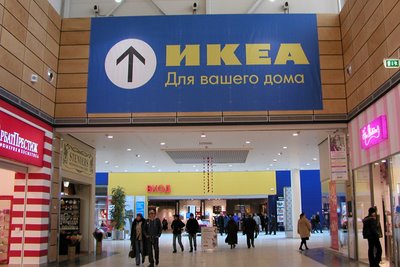
Entrance to an IKEA store in Rostov, Russia.
As economy is sliding down, and even the construction of the Moscow City is up in the air, one would think that Russians, and Kremlin especially, would want as much foreign investment as possible. It is well-known that Russians have had highest levels of disposable income comparing to other nations, and retail has made many Western companies wealthy. Among such companies was IKEA that has three stores in Moscow alone. IKEA built factories, streamlined supply chains, employed thousands of Russians, brought its products to the nation, and has helped Kremlin to look Western more than pictures of shirtless Putin did.
Nine years after the opening of the first IKEA store in Russia, and in the midst of the worst global financial crisis, one would think Russian regions, and especially Kremlin, would want more foreign money and positive PR abroad. IKEA had originally planned to open its new 1,400,000 square feet complex in November 2007 in Samara. But a year and a half later, the store remained closed. The Samara's store's opening was reportedly delayed on eight separate occasions, with local officials refusing each time to supply the necessary documents. The latest objection, according to IKEA, has been that the store is insufficiently resistant to hurricanes. That's a highly unusual requirement, in a region not previously noted for its high-power winds, reported the BusinessWeek. While its sales in Russia have been growing beyond expectation, problems seemed to have been piling up even faster; IKEA has publicly raged again against "blackmail, sabotage and pressure for bribes" from Russian officials. If Kremlin's latest slogan have been "fight with corruption" and "attract foreign investment," can someone help me understand if it's really that hard to imprison the gangsters with government titles who are not only killing the foreign investment (which fell by 45% in 2009), but alsoare hurting Russia's employment, economic development, and image abroad.


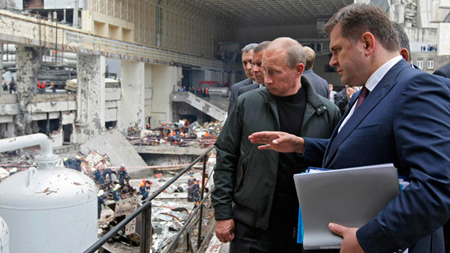
Russian Prime Minister Vladimir Putin, left, listens to Energy Minister Sergei Shmatko as he visits the Sayano-Shushenskaya hydroelectric power plant in southern Siberia on Friday, Aug. 21, 2009. (AP/RIA Novosti, Alexei Druzhinin)
Watch BBC video on the power plant explosion
Chechen terrorists have claimed responsibility for blowing up the Sayano-Shushenskaya Hydroelectric Power Plant, Russia's largest, and for the blast at a police station in Nazran. A group calling itself Riyadhus Salihiyn has announced its plans for stepping up "economic warfare" against Russia, the terrorists' priority targets being oil and gas pipelines, power plants, and major industrial enterprises. If in the case of the Siberian electric power plant Russian officials are shrugging off these allegations as "idiotic," the Nazran terrorist act, as well as the now almost daily terrorist attacks in Ingushetia, Dagestan, and in what seemed like a pacified Chechnya suggest that the North Caucasus situation is rapidly reaching boiling point, threatening to get out of state control.
The "Afghanization" of the Caucasus has both internal and external causes. Unemployment, corruption, blood feuds, criminal standoffs, and struggle between various local clans provide a fertile breeding ground for terrorism. All that is true, yet without serious financing and supply of weapons from abroad the scope of terrorist acts could hardly have been quite so great. That the Islamist gunmen have the backing of certain foreign agencies is not to be doubted, but to blame this on the United States, the UK and Israel, as Ingushetia President Yunusbek Yevkurov has done, is fairly short-sighted, to say the least.
Continue reading "Natural Allies: NATO, Shanghai Cooperation Organization, Collective Security Treaty Organization" »


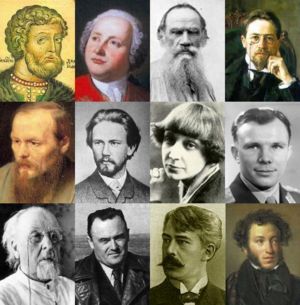
A few of the most famous Russians who ever lived
Editor's note: In this ninth part of his masters thesis, "The Misconception of Russian Authoritarianism", St. Petersburg University graduate Kevin Cyron argues that Russia has become so thoroughly integrated into the global economy that it can never return to a truly authoritarian system of government.
Click on the links to read previous installments in this series:
I
II
III
IV
V
VI
VII
VIII
Click on the extended post to read part nine of the extended essay.
Continue reading "The Misconception of Russian Authoritarianism:
Part 9 - The Pendulum: A Model for Understanding
Political Transitions in Russia" »


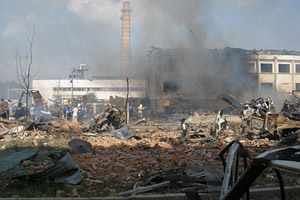
Site of a downtown police precinct in Nazran, Ingushetia, where a suicide bomber detonated a truck with over 2,000 pounds of explosives at 9 am on Monday, August 17 2009.
Monday August 17, two days before the explosions in Baghdad, a suicide bomber drove a truck loaded with a ton of explosives into a local police station in Ingushetia, killing at least 25 people and injuring over 136 civilians, including women and children.
Ingushetia and Chechnya are Russian territories in the country's south-eastern corner. Their status is comparable to the one of an American state within the U.S. The heads of the Russian "states" are traditionally called governors, mayors, heads, and presidents. Many westerners make a mistake thinking, for example, that the President of Chechnya heads his own country. Since the war in Chechnya ended, terrorists had been laying low until half a year ago. Surprisingly, only the murders of human rights activists find their way into Western news reports. However, the list of terrorist activities over the past few months has been full with murders of local judges, heads of villages and towns, armed attacks against police, and kidnappings. These events have been completely ignored by Western mass media.
Continue reading "Russia's South Ravaged by Terrorist Attacks" »


This article was originally published in the National Review Online
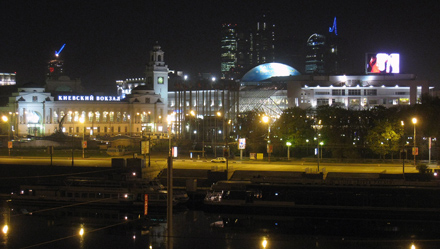
Moscow River embankment on a summer night (Photo by Yuri Mamchur)
MOSCOW -- German Sterligov is well known here, but unlike Roman Abramovich, Oleg Deripaska, and other publicly flamboyant Russian billionaires, he is little known abroad. Sterligov neither sails the Caribbean nor drinks in London's Mayfair district; most of the time he lives a traditional peasant lifestyle deep in the Russian countryside with his wife and five children. In winter, their farm is accessible only by horse-drawn cart, and the nearest house is seven miles away. Sterligov's way of life makes a strong Russian Orthodox statement and amuses Moscow's public.
 Sterligov made his fortune in the 1990s running a large barter business. He founded a mercantile exchange where Russians traded products they were unable to buy or sell for cash. He lived the luxurious life of a billionaire and owned properties in Moscow, London, and Manhattan. In 2004, after an ill-fated bid for Russia's presidency, Sterligov sold everything and moved to the countryside. Sterligov made his fortune in the 1990s running a large barter business. He founded a mercantile exchange where Russians traded products they were unable to buy or sell for cash. He lived the luxurious life of a billionaire and owned properties in Moscow, London, and Manhattan. In 2004, after an ill-fated bid for Russia's presidency, Sterligov sold everything and moved to the countryside.
Continue reading "The Benefits of Bartering" »



Click here to view enlarged map
The recent signing of the Nabucco pipeline project is definitely a political rather than economic deal. Its feasibility, the probability of its actual construction and its profitability aside, the deal shows clearly that, at least for the present, those who want to see a weaker Russia prevail over those who would rather see it strong and an integral part of the West. It is also obvious that without heavy Washington lobbying the Nabucco pipeline would never take off. Since there is practically no economic interest for the U.S. in it, Washington politics make the direction of the much advertised "reset" quite uncertain.
In the last 20 years since the collapse of communism every U.S. president has kept repeating that it is in American interests to see Russia as a strong, democratic, and prosperous nation. But actions rarely suit the words. Washington needs, and often gets, Moscow's cooperation on major security issues, but then it turns around and does its damnedest not only to prevent "non-democratic" and "authoritarian" Moscow from becoming an energy superpower, but to make sure that it gets as little cash as possible -- by diverting this cash to former Soviet republics where democracy is so rudimentary as to be barely discernible, while Oriental despotism, sometimes hereditary, is very much in evidence. So much for the hugely advertised U.S. democracy promotion mission.
Continue reading "Pipeline to Nowhere" »



It does not seem to excite Russians terribly much, and it is hardly noticed in the U.S. and Europe, but Russia's GDP just dropped 10.9 percent in the second quarter. That comes after a 9.8 percent drop in the first quarter. This is grim.
The go-go economies of Moscow and St. Petersburg also seem to be deteriorating. Restaurants see a 20 percent drop in business. Can the madcap nightclub life of Moscow be far behind?
President Medvedev is calling for investigation of state-owned enterprises, thought to be hubs of inefficiency, waste and corruption. A new restructuring may be in order in the long run. In the short term, should we expect firings?
Regardless, Russia seems to be suffering a recession that may be wider and deeper than that which afflicts America. It also may last longer.



by Dr. Ildar Ablayev
Chapter 1 of Dr. Ablayev's book "Regional Gold Markets in Russia's Economy", from which this piece is excerpted, deals with how Russia emerged from a command, non-market economy to its current status where the integration of the market into the authoritarian model of Russian governance is causing what he calls a "vertical layering" of the market. As a result, a unique Russian multi-level market system has been created.
Click on the extended post to read more.
Continue reading "National Particularities of Russia's Market" »



The pro-Israeli Debka file is reporting the disturbing assertion that the Russian intelligence agency, FSB, was instrumental in rolling up an Israeli spy ring within the Hezbollah-controlled regions of Lebanon.
If the Debka story is not true, Moscow should shed some light on the claims. Hezbollah is a terrorist group that is consistently at odds with the more peaceable elements in Lebanon. Syria is supportive of Hezbollah and Russia may be eager to retain ties with the Assad regime. But to this extent?
Visit the extended post to read the Debka report in full:
Continue reading "FSB Involvement in Lebanon?" »


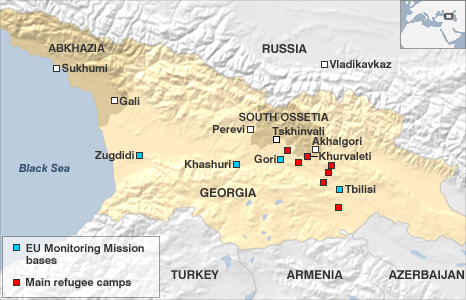
Map of region Source: BBC
As the first anniversary of the brief war in South Ossetia approaches, it appears what peace does exist continues to be set against a backdrop of tension and accusation.
According to the New York Times, over the weekend South Ossetia authorities "reported two rounds of mortar fire coming from Georgian-controlled territory." Meanwhile, according to the BBC, Georgia is accusing Russia of "moving border posts along the boundary between Georgia and...South Ossetia." The European Union and its monitoring group, the EU Monitoring Mission in Georgia isn't confirming either "claim," according to the BBC.
The anniversary of last year's conflict is August 7, so there are a few more days for clarity to develop.
Click here to read the official statement by the presidents of South Ossetia and Abkhazia. It, clearly, reflects their vision of the last year's conflict.



Russian children at Tsarskoe Tselo outside St. Petersburg, October 2007
Photo by: Charles Ganske
Editor's note: In this tenth and final part of his masters thesis, "The Misconception of Russian Authoritarianism", St. Petersburg University graduate Kevin Cyron presents the Soviet dissident writer Alexander Solzhenitsyn's response to the charge that his country has reverted to authoritarianism under the Putin Administration. Mr. Cyron also reminds us that democracy is a process and not a destination for any nation. Mr. Cyron concludes with optimism for the future of Russia and the Russian people.
Click on the links to read previous installments in this series:
I
II
III
IV
V
VI
VII
VIII
IX
Click on the extended post to read the tenth and final installment in this series
Continue reading "The Misconception of Russian Authoritarianism:
Part 10 - Russia's Future: Reasons for Optimism" »
|
 |





















